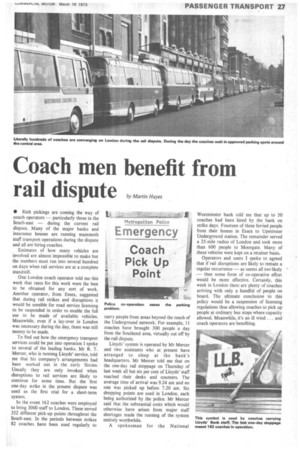Coach men benefit from
Page 29

If you've noticed an error in this article please click here to report it so we can fix it.
rail dispute by Martin Hayes
• Rich pickings are coming the way of coach operators — particularly those in the South-east — during the current rail dispute. Many of the major banks and insurance houses are running mammoth Staff transport operations during the dispute and all are hiring coaches.
Estimates of how many vehicles are involved are almost impossible to make but the numbers must run into several hundred on days when rail services are at a complete standstill.
One London coach operator told me this week that rates for this work were the best to be obtained for any sort of work. Another operator, from Essex, suggested that during rail strikes and disruptions it would be sensible for road service licensing to be suspended in order to enable the full use to be made of available vehicles. Meanwhile, even if a lay-over in London was necessary during the day, there was still money to be made.
To find out how the emergency transport services could be put into operation I spoke to several of the leading banks. Mr R. T. Mercer, who is running Lloyds' service, told me that his company's arrangements had been worked out in the early Sixties. Usually they are only invoked when disruptions to rail services are likely to continue for some time. But the first one day strike in the present dispute was used as the first trial for a short-term system.
In the event 162 coaches were employed to bring 3000 staff to London. These served 352 different pick-up points throughout the South-east. In the periods between strikes 82 coaches have been used regularly to carry people from areas beyond the reach of the Underground network. For example, 11 coaches have brought 300 people a day from the Southend area, virtually cut off by the rail dispute.
Lloyds' system is operated by Mr Mercer and two assistants who at present have arranged to sleep at the bank's headquarters. Mr Mercer told me that on the one-day rail stoppage on Thursday of last week all but six per cent of Lloyds' staff reached their desks and counters. The average time of arrival was 9.24 am and no one was picked up before 7.20 am. Six dropping points are used in London, each being authorized by the police. Mr Mercer said that the substantial costs which would otherwise have arisen from major staff shortages made the running of the system entirely worthwhile.
A spokesman for the National Westminster bank told me that up to 50 coaches had been hired by the bank on strike days. Fourteen of these ferried people from their homes in Essex to Uptninster Underground station. The remainder served a 25-mile radius of London and took more than 600 people to Moorgate. Many of these vehicles were kept on a retainer basis.
Operators and users I spoke to agreed that if rail disruptions are likely to remain a regular occurrence — as seems all too likely — then some form of co-operative effort would be more effective. Certainly, this week in London there are plenty of coaches arriving with only a handful of people on board. The ultimate conclusion to this policy would be a suspension of licensing regulations thus allowing coaches to pick up people at ordinary bus stops where capacity allowed. Meanwhile, it's an ill wind. .. and coach operators are benefiting.
























































































































